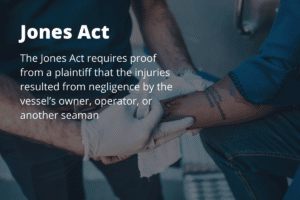Under maritime law, the Jones Act allows qualified seamen to seek legal compensation from their employer for their financial losses and the consequences of their physical injuries. There are, however, several provisions of the law, including specific liability guidelines and regulations. The Jones Act requires proof from a plaintiff that the injuries resulted from negligence by the vessel’s owner, operator, or another seaman. The act also allows seamen to sue their employer if their injuries were caused by a defect in its design or manufacture that made the vessel unseaworthy. It is important to note that only persons who are legally qualified can file lawsuits under the Jones Act law.

Legal Qualifications for Jones Act Compensation
Based on federal laws applied to railway workers, the Jones Act’s personal injury provisions provide seamen and their families the right to “bring a civil action at law, with the right by trial by jury, against the employer” if they are injured or killed due to negligence.
Per maritime law, a seaman is someone who has an employment-related connection with a specific ship or shipping company. He must spend at least 30% of his working time with that ship or fleet of ships. In addition, the employee’s duties must directly contribute to the ship’s functions or to accomplishing its assigned tasks. If a worker legally meets these two qualifications, he is covered by the Jones Act personal injury clauses as a seaman.
In contrast, shore-based workers in ports and harbors who are injured aboard a ship or other vessel do not automatically qualify to file claims under the Jones Act. In 2002, the U.S. Second District Court of Appeals rejected a longshoreman’s Jones Act lawsuit against Weeks Marine and Collazo Contractors because the plaintiff, Gerard O’Hara, did not meet the Act’s definition of a seaman. The court did find, however, that O’Hara had submitted evidence of the defendant’s negligence that met the legal requirements of the Longshore and Harbor Worker Compensation Act (LHWCA), which covers dock workers, stevedores, and other port facility employees. This gives longshoremen similar legal protection against negligent employers or ship operators.
Other Jones Act Qualifications
An important concept in Jones Act qualifications is the vessel’s legal requirement to be “in navigation.” Under maritime law, a vessel is said to be “in navigation” if it is floating on water, operable, able to travel unassisted by tugs or other vessels, and in navigable waters which are suitable for domestic and foreign trade. Navigable waters can be:
- Rivers
- Oceans
- Inland lakes shared by two or more states or linked to other navigable bodies of water
A vessel does not have to be moving to be in navigation. A ship moored to a dock or passenger terminal can be considered to be in navigation if it is floating on water as long as it is legally under corporate ownership and carrying out its tasks. However, if the ship is being refitted or repaired on a drydock, it is not legally in navigation.
There are other qualifying factors that define what vessels can be considered to be “in navigation” per Jones Act law. For example, a cargo ship which just docked at Port Everglades to deliver its cargo fits the legal parameters of being in navigation even though it is tied at the quay. On the other hand, a new cruise ship being tried out for seaworthiness and awaiting delivery to its owners may be steaming around on the ocean, but it is not officially part of the cruise line’s fleet. That vessel is not legally in navigation even though it’s afloat.
These legalities may seem trivial, but they are crucial in civil cases where the Jones Act is invoked.